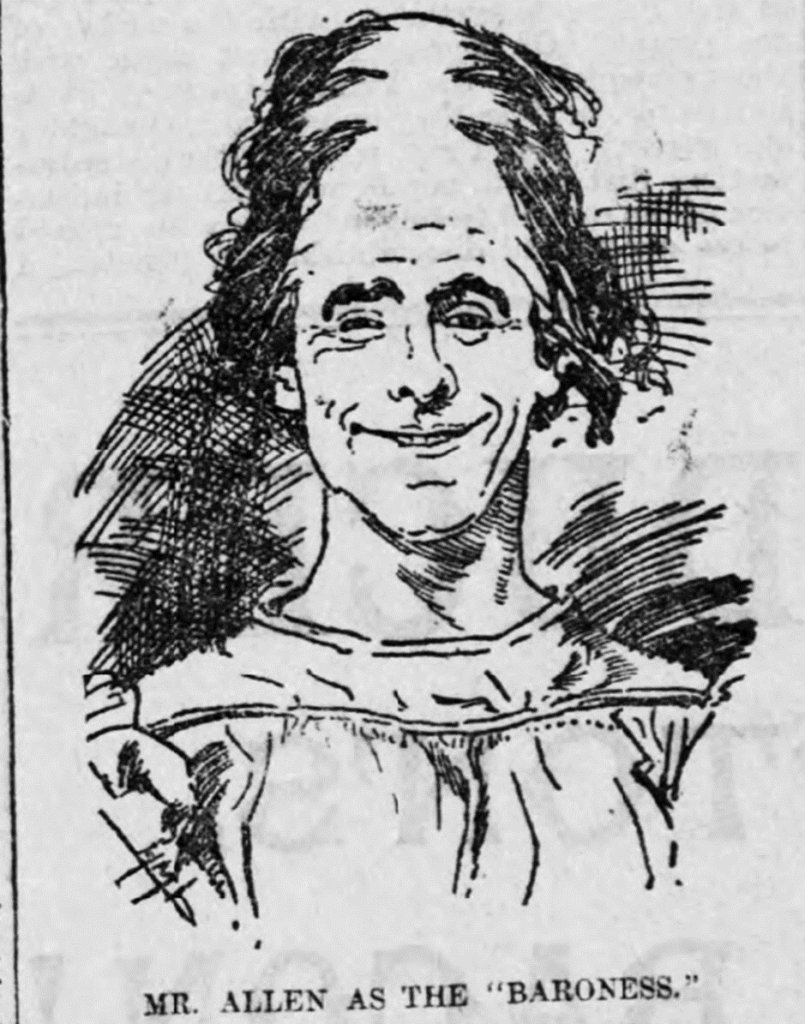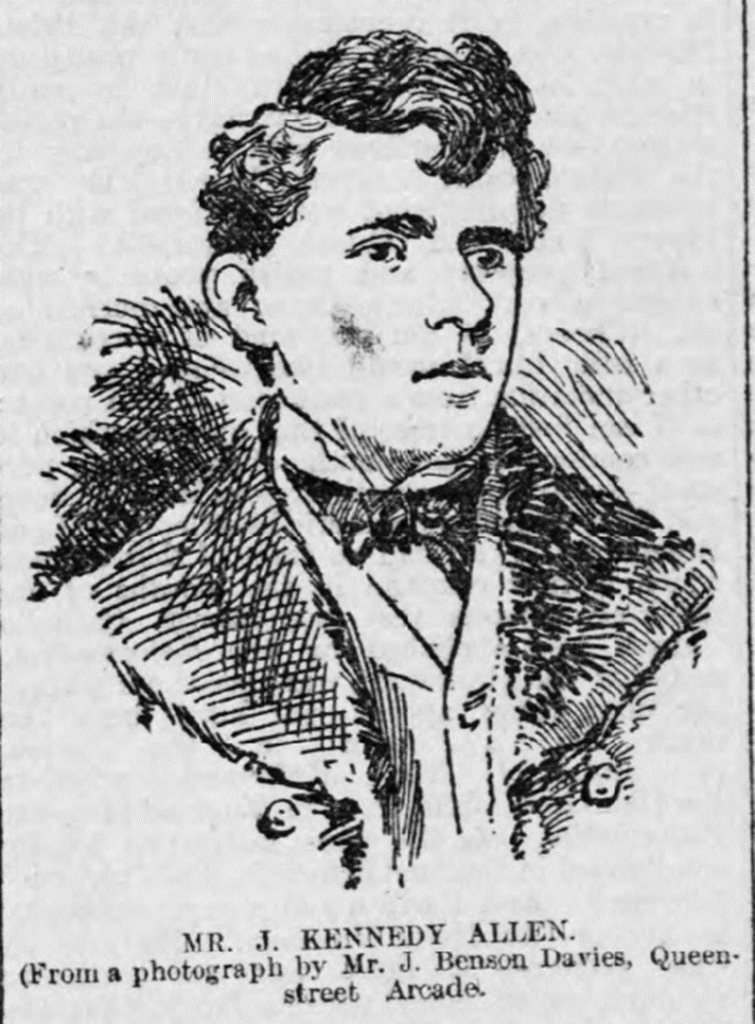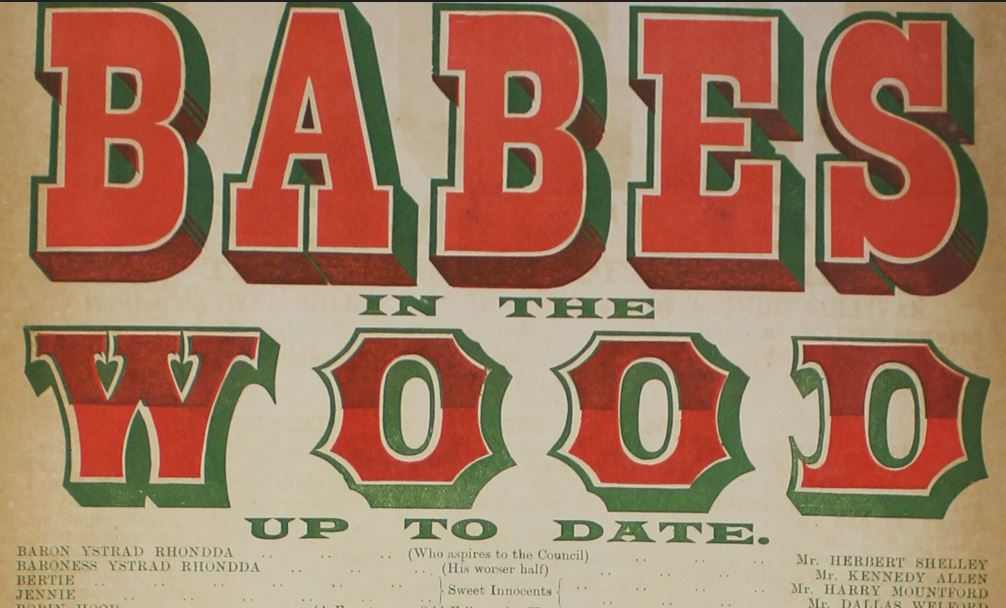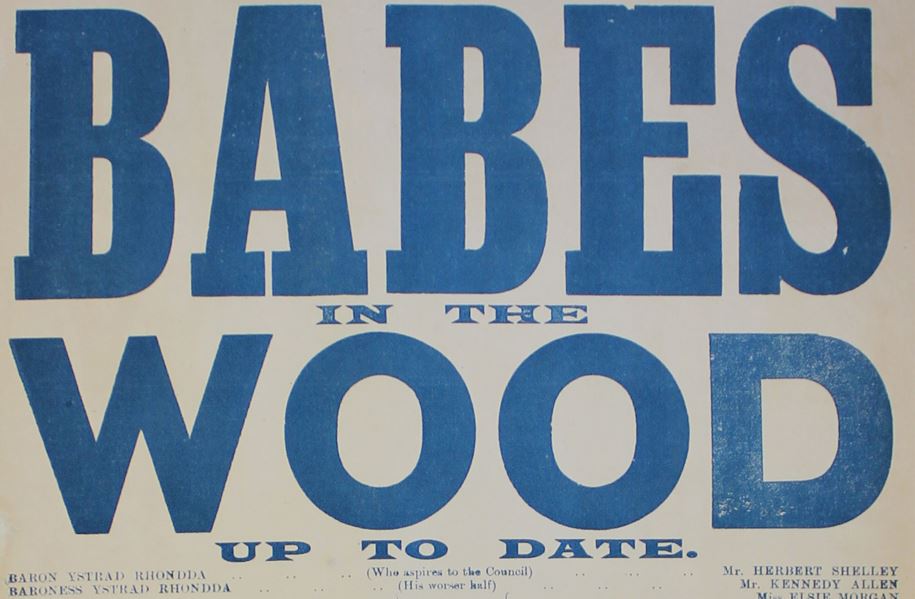In 1895 this interview appeared with a music hall performer who appeared as ‘The Baroness of Ystrad Rhondda’:
Mr. Kennedy Allen Tells the Story of His Stage Career and What he Thinks of the Welsh Language.

One of the characters which will perhaps, be best remembered by those who have seen the Cardiff pantomimes will be that of “The Baroness of Ystrad Rhondda” in “The Babes in the Wood,” so humorously portrayed by Mr Kennedy Allen, who makes most effective use of Welsh colloquialisms all through his part. The other night one of our representatives (thanks to the permit given him by Mr. Edward Fletcher) discovered the “Baroness” in his dressing-room, minus his fantastic bodice and wig, and looking with melancholy cast of countenance at the ceiling as if trying to remember some old wheeze of the pre-Adamite period.
“How serious he looks,” remarked the pressman to “Simple Simon,” who has been sharing the dressing-room of the male “Baroness” at the Royal.
“All comic men are affected that way,” was the reply.
The “Baroness” heard our whispered conversation, and looked up. “I have come to interview your ladyship,” said the reporter, making obeisance.
“Oh,” said the “Baroness,” reflectively. “Being a ‘new woman,’ I thought I was of ‘no importance.’ but if I can give you anything to interest your readers I shall be most happy- ‘fawn ni marw disgul chi!’” [we’ll die because of you]
“Tell me something about your career,” said I, producing my note-book.
“With pleasure,” quoth the “Baroness.” “Well, I was born in Sheffield of poor, but honest – as you say – you may have heard that before. On the 17th of January, 1870, I first saw the light, at the early age of one minute. I howled to see the world. Yes! that was undoubtedly my first appearance on any stage. I was not intended for the theatrical profession. My father never entered a theatre in his life, and my introduction was rather peculiar. I first appeared at the Theatre Royal, Wakefield, about the year 1878, in the pantomime, “The House that Jack Built,” under the management of Mr. and Mrs. Stoner.
“How did I get this engagement? That is the peculiar part of the business. I was walking by the theatre one day and saw a crowd of children round the stage door, and joining them to see the fun, I was carried by the throng into the building, and my name entered in a book, and was told to come next day for rehearsal. I was cast, for a small part, I had to take a slice of bacon to my husband and inform him that it was Friday, and he couldn’t expect anything better at the end of the week. I must confess the humour of the lines does appear vague to me now, but the audience evidently understood it, for they were greatly delighted, and I made quite a hit in the small part. But my respected parent, hearing of his only son’s precocity, jaunted me home from the theatre one night, soundly spanked me, put me to bed, and thus ended my first Thespian engagement. Naturally, this planted an irrepressible longing for histrionic fame in my infant breast, but I was put at a judicious age in the offices of Dorman, Long, and Company, Middlesbrough, there to study, not theatrical roles, but iron rolls, and rollers and other contrivances connected with the duties of a practical engineer.
“No, I did not relish the work, and at the first opportunity I joined a travelling company, with an extensive wardrobe carefully done up in a pocket handkerchief. I had a rough time with them, plenty of experience, but very little money. My arithmetic was often severely put to the test; for instance, one week my landlady’s bill was 18s. 6d., and my salary for that six nights amounted to the colossal sum of 3s. 6d. Eighteen and six into three and six won’t go, so I had to go and procure fresh lodgings. Oh! ye stage struck youths and youthesses, think of that and weep!”

“I shall never forget my first speaking part as a full-fledged actor. I was a faithful menial, and I had to discover my beloved mistress weeping piteously, and was to remark-’Madam, what has discomposed you?’ I stalked on in the full flush of pride, – and a pair of padded calves, and faintly ejaculated (to the intense amusement of everybody but myself) — “Madam, what hath decomposed you?’ – The stage manager’s emphatic appeal that I had better come off! was gloomily obeyed. I shrank within myself like a boiled whelk for the rest of the season, and had no more speaking parts allotted to my untrustworthy care.
“Oh, since then I have been on the variety stage, and the legitimate boards in all parts of England, Ireland, Scotland, and Wales — big and little, (principally the latter). I have been for the past three or four years chiefly in the Welsh districts.”
“How do you account for your aptitude in the Welsh dialect?” said the pressman, getting a word in edge ways.
“Oh, perhaps it’s because I eat so many Welsh rabbits,” said the “Baroness, with a weird smile. “I have, I think, a natural aptitude for picking up dialects, but I really think the Welsh is the most delicious dialect of all with which I am acquainted. There is a certain difficulty in playing a dialect part amongst the people who speak it. One has to be careful not to over accentuate and give offence. But then, where no offence is meant, none is ever taken, and when the object is harmless fun, the end is smoothily attained.”
“Oh, yes! I am pretty well acquainted with ‘Cymraeg’ and am studying it as an amusing and instructive recreation.”
“Have you ever had any serious accidents?”
“Yes, very serious. About this time last year I was playing the ‘Widow Quankey’ at Ferndale. I was sweetly singing my song, when, all at once, the electric light went out. The gas was put on, and that went out, when suddenly an alarm of ‘Fire!’ was raised, and then the audience began to go out. I sang them two or three verses in the dark, but even my seductive voice could not entice them to remain to hear an invisible vocalist, so they departed thence, and in the silent gloom of the dressing room, whilst putting on my pants, the pocket turned inside out. and I lost my money. That was a very serious accident for me. The Ferndale populace will remember the occurrence. I shall never forget it.”
“I suppose it’s a case of constant separations and meetings?” I remarked, wondering if “Simple Simon’’ and his “Baroness” would ever occupy the same dressing-room again after their present engagement together.
“Oh,” remarked the loquacious “Baroness,” “you never know when, where, or how, you will meet each other in our profession. For instance, one of my bosom friends in my unfledged days, who commenced in the same company as myself, and who was the possessor of a distinct, glaring blend of red and auburn hair, was separated from me by the earnest request of the manager, who desired him to depart to other climes at the end of a fortnight (in vulgar term, gave him the sack). He departed, and was lost to my sight, for five or six long years. One night the ‘crowd’ I was with visited Stockton, during the race week. With difficulty I procured a cot in a double-bedded room, and there — oh, generous Fate! —was that room companion serenely slumbering. I was soon in the same hemisphere. In me morning, chancing to awaken first, I glanced across the room. and there—oh, generous Fate! was that unmistakable bunch of carrots. A few vigorous bangs with a pillow soon made my old acquaintance lively, and I learned — oh, horrors! — that the stage had lost him; for he was travelling with somebody’s “patent vegetable soup.” Fortunately, he had some of his samples with him, so we. feasted our friendship right royally.
“No; there is no moral to the story. It is simply a fact — the partings and meetings in our particular

business.
At this the “Baroness” put on his wig in preparation for his next entrance and the interview abruptly terminated.
Mr. Allen take, his benefit to-morrow (Saturday) night at the Royal, when many extra novelties will appear and a bumping house should reward his efforts to amuse. Next week he appears at the Empire in new songs the following fortnight he goes to Newport and Swansea respectively, under the enterprising management of Mr. Oswald Stoll.
“Dyna i chi!” [That’s for you!]
Source: Evening Express, 1 February 1895; The Western Mail, 26 December 1894
Posters featuring The Baroness of Ystrad Rhondda by kind permission of Glamorgan Archives:


Ref: D452-9-16


Ref: D452-9-17
Posters featuring Kenneth Allen by kind permission of Glamorgan Archives:


Ref D452-9-18 & D452-9-49
All four posters may not be used without the permission of Glamorgan Archives.